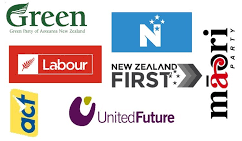September 23 has been circled on calendars for months, and now the 2017 General Election is just days away. Political parties have released their policies and the election frenzy is ever-intensifying. What might these policies mean for employment standards? Where do the major political parties stand on important employment issues?

National
Although there are no promises of wage increases, the National Party has made clear that the minimum wage has increased every year since they took office in 2008 and that this is set to continue. This is said to be achieved by raising the minimum wage at a sustainable rate to ensure fair pay for workers while not costing jobs.
Workplace health and safety is also on the National Party agenda. Recent health and safety legislation has New Zealand well on its way to meeting the target of a 25 per cent reduction in serious workplace injuries by 2020.
Paid Parental Leave will also be extended to 22 weeks to support families with newborns. This package will initially increase Paid Parental Leave by two weeks on 1 July 2018 followed by a further two weeks on 1 July 2019. The package will allow both parents to take time off at the same time so they can be at home with their baby together.
The National Party have also introduced the Pay Equity and Equal Pay Bill which aims to eliminate and prevent pay discrimination on the basis of sex. A pay equity claim will have merit if there are reasonable grounds to believe that the work has been undervalued historically and continues to be undervalued today. If a claim has merit, then the employer and employee will enter into bargaining on a settlement. This bargaining will include an assessment of the nature and remuneration of the work and comparable work.
Labour
The Labour Party has pledged to increase the minimum wage to $16.50 an hour and to base further increases on the real cost of living for people on low incomes. Over time, it is intended that the minimum wage will be lifted to 66% of the average wage as economic conditions allow. Furthermore, the Labour Party has committed to paying all public sector employees at least the Living Wage. The Labour Party also intends to double the number of Labour Inspectors to 110 to help ensure people’s rights are protected.
The Labour Party also intends to re-assess the current trial period laws. They allege that the current “fire at will” law is unfair because it denies employees any recourse against unfair treatment and unjustified dismissal. Instead, Labour will replace the existing law with trial periods that include recourse for employees in the event of unjustified dismissal. Labour will establish a new referee service for claims of unjustified dismissal during trial periods. The referee will hold short hearings without lawyers present and will be able to make decisions to reinstate or award damages. These hearings will be provided free for the parties involved.
Labour has committed to passing legislation extending paid parental leave within their first 100 days in office. From 2018, 22 weeks paid parental leave will be available and from 2020, 26 weeks.
The Labour Party did not support the recent Pay Equity and Equal Pay Bill proposed by the National Party. Instead, Jacinda Ardern committed to throwing out the Pay Equity Legislation and redrafting it if Labour gets into office. She said that the Bill was over-restrictive and would stop further settlements such as the TerraNova settlement for health care workers. As an alternative, the Labour Party intends to implement “Fair Pay Agreements (FPAs)” which will be agreed by businesses within an industry and the unions representing workers within that industry. These FPAs will set basic standards for pay and other employment conditions within an industry. FPAs will create a framework for fair wage increases where good employers are not commercially disadvantaged for paying their workers a reasonable wage.
New Zealand First
New Zealand First have pledged to raise the minimum wage to $20 per hour in the first instance while also reducing taxes for businesses to ensure employers are able to cover this increase. They are also in favour of abolishing the ‘starting out wage’ for young people.
New Zealand First have also proposed to review and amend employment laws to ensure that casual employment practices are fair and just to all parties and work to achieve better job security for individuals now employed on a permanent ‘casual’ basis.
Green
Similarly, the Green Party intend to raise the minimum wage to $17.75 an hour in 2018 with a goal of maintaining it at 66% of the average wage. They also support making the minimum wage compulsory for all workers, including youth and employed trainees. Employees’ entitlement to sick leave will also increase under the Green Party who intend to increase sick leave to a minimum of 10 days a year so that parents have time to look after sick kids.
The Green Party also opposes the Pay Equity and Equal Pay Bill, saying that it will make it harder for women to be paid fairly. The Green Party promises to introduce new, effective legislation and create a Pay and Employment Equity Commission to analyse data on employment equity and work with employers on pay equity. Furthermore, the Green Party has pledged to ensure women who work for the government are fairly paid by 2025.

